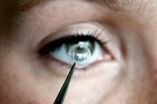(Press-News.org) Can you bite into an apple? If so, you are more likely to maintain mental abilities, according to new research from Karolinska Institutet in Sweden.
The population is ageing, and the older we become the more likely it is that we risk deterioration of our cognitive functions, such as memory, decision-making and problem solving. Research indicates several possible contributors to these changes, with several studies demonstrating an association between not having teeth and loss of cognitive function and a higher risk of dementia.
One reason for this could be that few or no teeth makes chewing difficult, which leads to a reduction in the blood flow to the brain. However, to date there has been no direct investigation into the significance of chewing ability in a national representative sample of elderly people.
Now a team comprised of researchers from the Department of Dental Medicine and the Aging Research Center (ARC) at Karolinska Institutet and from Karlstad University in Sweden have looked at tooth loss, chewing ability and cognitive function in a random nationwide sample of 557 people aged 77 or older. They found that those who had difficulty chewing hard food such as apples had a significantly higher risk of developing cognitive impairments. This correlation remained even when controlling for sex, age, education and mental health problems, variables that are often reported to impact on cognition. Whether chewing ability was sustained with natural teeth or dentures also had no bearing on the effect.
###
The results are published in the Journal of the American Geriatrics Society (JAGS). The study was financed with grants from several funds, including the Swedish Council for Working Life and Social Research and the Swedish Research Council.
Publication: 'Chewing Ability and Tooth Loss: Association with Cognitive Impairment in an Elderly Population Study', Duangjai Lexomboon, Mats Trulsson, Inger Wårdh & Marti G. Parker, Journal of the American Geriatrics Society, online early view 4 October 2012.
For further information, please contact:
Professor Mats Trulsson
Department of Dental Medicine – Karolinska Institutet
Tel: +46 (0)8-5248 8036 or +46 (0)70-636 8036
Email: mats.trulsson@ki.se
Professor Marti G. Parker
Aging Research Center – Karolinska Institutet and Stockholm University
Tel +46 (0)8 690 6869
Email: marti.parker@ki.se
Websites: www.ki-su-arc.se and www.sweold.se
Contact the KI Press Office: ki.se/pressroom
More on Karolinska Institutet – a medical university: ki.se/English
Chewing ability linked to reduced dementia risk
2012-10-04
ELSE PRESS RELEASES FROM THIS DATE:
No evidence for 30-nm chromatin fibers in the mouse genome
2012-10-04
HEIDELBERG, 4 October 2012 – Scientists in Canada and the United States have used three-dimensional imaging techniques to settle a long-standing debate about how DNA and structural proteins are packaged into chromatin fibres. The researchers, whose findings are published in EMBO reports, reveal that the mouse genome consists of 10-nm chromatin fibres but did not find evidence for the wider 30-nm fibres that were previously thought to be important components of the DNA architecture.
"DNA is an exceptionally long molecule that can reach several metres in length. This means ...
New gene test detects early mouth cancer risk
2012-10-04
Researchers from Queen Mary, University of London have developed a new gene test that can detect pre-cancerous cells in patients with benign-looking mouth lesions. The test could potentially allow at-risk patients to receive earlier treatment, significantly improving their chance of survival.
The study, published online in the International Journal of Cancer, showed that the quantitative Malignancy Index Diagnostic System (qMIDS) test had a cancer detection rate of 91-94 per cent when used on more than 350 head and neck tissue specimens from 299 patients in the UK and ...
Top executives' team spirit affects whole business
2012-10-04
Los Angeles, CA(04 October, 2012) Effective teamwork among an organization's top management makes employees happier and more productive, with positive benefits to the organization.
Despite an abundance of research on teamwork in the workplace, studies of how teamwork right at the top impacts employees lower down the food chain is surprisingly thin on the ground. Now researchers have surveyed business theory and put it to the test empirically, showing that top management's behaviour does trickle down. This new research is published by SAGE in the journal Human Relations.
Does ...
Olympic legacy: Tackling the 'East London Diabetes Belt' is a major challenge
2012-10-04
A study by Queen Mary, University of London researchers has shown the scale of the challenge facing those in charge of delivering the Olympic legacy. In three London boroughs they have found that, overall, as many as one in ten of the local population has a high risk of developing type 2 diabetes within the next ten years. In some areas close to the Stratford Olympic Park up to one in six adults are at high risk.
The study, published in the British Journal of General Practice [1], analysed half a million electronic records for all people without diabetes, aged between ...
Strathclyde take the lead in space research
2012-10-04
Academics at the University of Strathclyde in Glasgow are set to investigate the removal of space debris and deflection of asteroids – leading the first research-based training network of its kind in the world.
The 'Stardust' project will train the next generation of scientists, engineers and policy-makers with Strathclyde leading 14 partners across Europe in a new €4 million programme.
The European Commission-funded network will launch early next year and its pioneering research will have a significant impact on the future decisions of Europe on some of the most pressing ...
Science fiction is not put to good use in teaching
2012-10-04
A study at the University of Valencia ensures that science fiction, especially the cinema, is very popular amongst secondary school students and teachers see it as a good way of motivating interest in the sciences. However, out of the 31 textbooks analysed, only nine make some form of reference to science fiction cinema as a teaching resource.
"A current concern is that students are no longer studying science and engineering and this trend is more common amongst females. Science fiction can be useful in awaking the scientific vocation of younger students," as explained ...
Hi-fi single photons
2012-10-04
Many quantum technologies—such as cryptography, quantum computing and quantum networks—hinge on the use of single photons. While she was at the Kastler Brossel Laboratory (affiliated with the Pierre and Marie Curie University, École Normale Supérieure and CNRS) in Paris, France, Virginia d'Auria and her colleagues identified the extent to which photon detector characteristics shape the preparation of a photon source designed to reliably generate single photons. In a paper about to be published in EPJ D, the French team determined the value of key source parameters that ...
Lakes react differently to warmer climate
2012-10-04
The study in question has been carried out by a group of researchers at the Department of Biology at Lund University. The research team is specifically focusing on predictions regarding how our water resources will be like in the future, in terms of drinking water, recreation, fishing and biodiversity. They have now published findings on the impact of a warmer climate on lakes in the journal Nature Climate Change.
"The most interesting and unexpected result from the study is that the reaction to climate change will vary between lakes; this has been observed previously ...
Artificial cornea gives the gift of vision
2012-10-04
Our eyes are our window to the world. Thousands of people have lost their eyesight due to damages to the cornea, such as trauma, absent limbal stem cells or diseases. Transplantation of a donor cornea is the therapy of choice for a great number of those patients. Let alone the issue of scarce donor material, a sub-group of patients do not tolerate transplanted corneas, necessitating the employment of an alternative means of restoring eye sight. In Germany alone, around 7,000 patients are waiting to be treated. In close cooperation with the Aachen Centre of Technology ...
Researchers a step closer to controlling inflammation in MS
2012-10-04
A University of Adelaide researcher has published results that suggest a possible new mechanism to control multiple sclerosis (MS).
Dr Iain Comerford from the University's School of Molecular and Biomedical Science earned a three-year fellowship from MS Research Australia to work on this project. It is directed towards understanding how specific enzymes in cells of the immune system regulate immune cell activation and migration.
Along with his colleagues, Professor Shaun McColl and PhD students Wendel Litchfield and Ervin Kara, he focused on a molecule known as PI3Kgamma, ...



